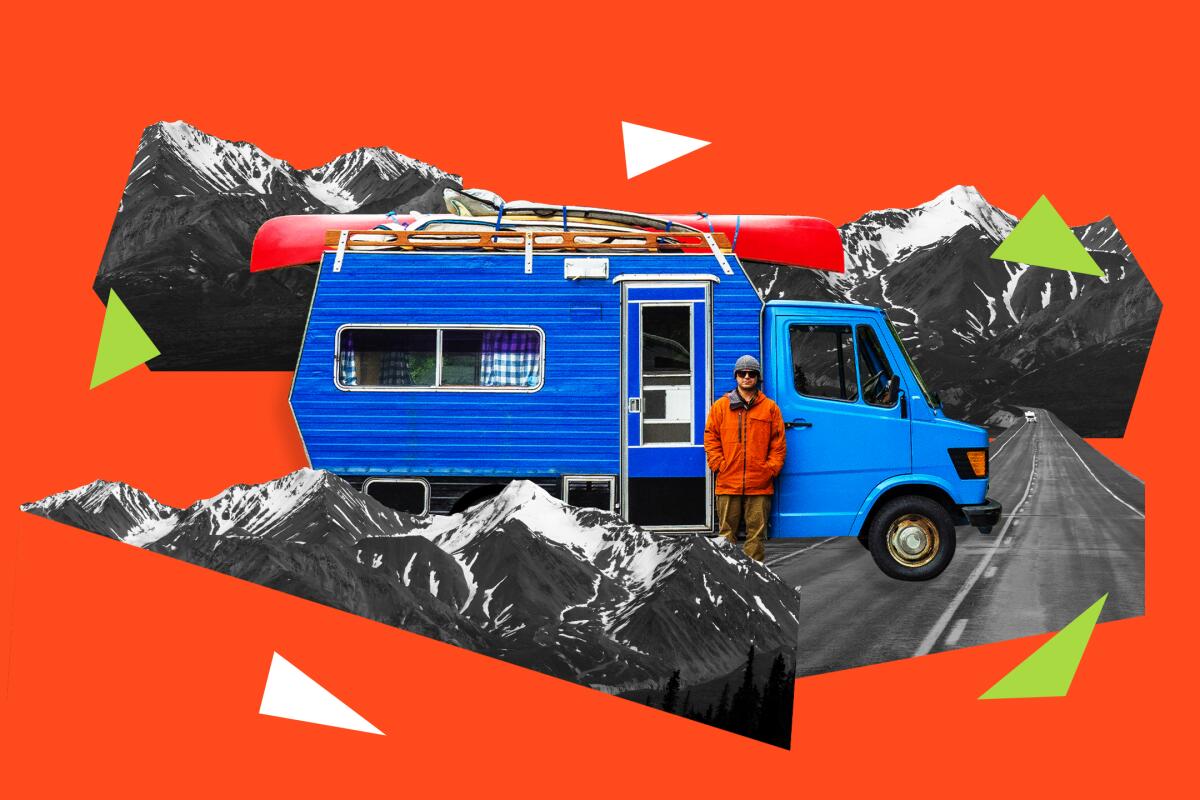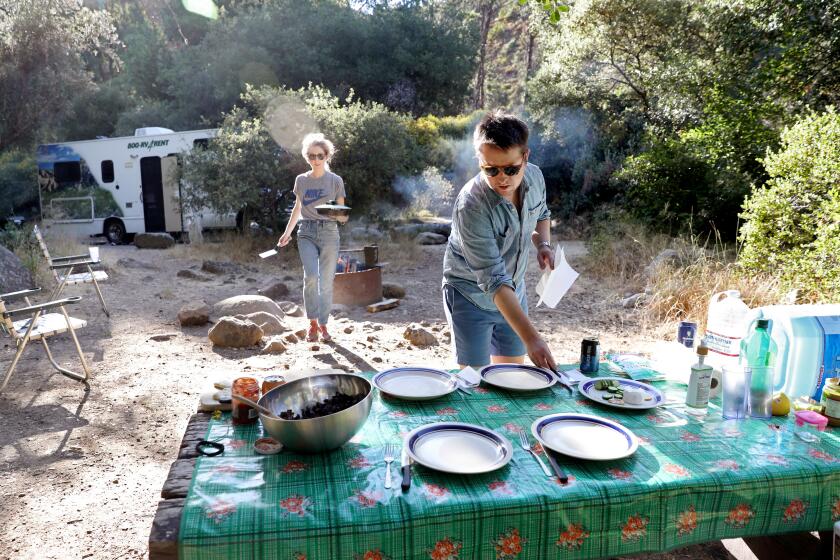Headed on a first-time RV road trip? Read these tips first

- Share via
Hardcore travelers stumbled onto a rough road this year when the coronavirus pandemic locked them down at home. Unable to satisfy their wanderlust, they bided their time. But four months later, with travel still a scary proposition, a popular alternative has emerged: RV trips. Travelers carry their homes, complete with personally sanitized bedrooms, bathrooms and kitchens, with them in tortoise-like fashion.
The trend is on a roll nationwide: Sales of RVs have increased nearly 200% over last year, according to the RV Industry Assn., with sales booming coast to coast.
Newbie RVers see the vehicles as a way to get outside in a safe and secure environment they can control.
“Camping ... is the perfect COVID vacation,” said CNBC’s Jim Cramer during a broadcast in early June. “You can still practice social distancing, especially if you’ve got an RV,” the “Mad Money” host said, adding that shares in several RV-related companies have shot up by triple digits.
Camping World, with 156 locations, had “the most RV sales in the history of our business” on a busy weekend in May, said Matthew Wagner, executive vice president.
Get The Wild newsletter.
The essential weekly guide to enjoying the outdoors in Southern California. Insider tips on the best of our beaches, trails, parks, deserts, forests and mountains.
You may occasionally receive promotional content from the Los Angeles Times.
New vehicles aren’t the only ones in demand. Long Beach resident Pat Schaefer and daughter Kelsey took their first camping trip in early June in a 2001 Volkswagen Eurovan, a converted van they recently bought.
“Kelsey said a lot of people were fixing up the old vans, so we decided to try it,” said Pat, adding, “I really need to go places. I’m not a stay-at-home person, and I was going crazy.”
Their trial run, a weekend trip to the bucolic countryside near Buellton, Calif., did the trick. “It was easy and refreshing. We loved it,” she said.
First-timers, however, don’t always find their initial trip easygoing; most find it challenging. Feeling comfortable behind the wheel can be elusive, whether you’re driving a self-contained motor home or using your own vehicle to pull a trailer, often called a tow-behind or a fifth-wheeler.
With the coronavirus crisis roiling vacation plans, some are turning to travel that allows for social distancing, including RV camping. This reporter tried it.
“It felt like we were hauling around the Venetian hotel,” said Ontario resident Jon Neville about his first trip with his wife and two children. The Memorial Day holiday jaunt took them to the Colorado River in their new Forest River Sandpiper. Combined with the truck that pulls it, the unit is about 50 feet long.
“I was worried that my truck wasn’t heavy enough to pull it, that I wouldn’t be able to stop going downhill, that I wouldn’t be able to park it.”
But everything worked out fine, Neville said. “My mindset was that something was going to go wrong. I think that’s what you have to do; just expect the worst. Then you can relax when it doesn’t happen.”
Cost: More than you think
Another big issue for RVers is expense. “It will always cost more than you think it will,” said Brad Marchand of Livermore, Calif., who travels with sons Alex, 8, and Zac, 6, in a 34-foot Coachmen Class C Leprechaun, which he bought used for $55,000.
Prices for new RVs typically start at $6,000 for folding camping trailers and truck campers that sit in the bed of a pickup, according to the industry association. Class C motor homes, similar to the Coachmen Marchand owns, often sell for $65,000 to $100,000.
Rentals average about $150 a night but can go up to $800. Expect to pay a per-mile fee too. Some dealerships rent vehicles, as do private owners on services such as RVshare.com.
“Cost was a real eye-opener for me when I added up gas, the price of staying at a park, storage, insurance and upkeep,” Marchand said.
Motor homes get six to 12 miles per gallon and have gas tanks that hold 55 to 80 gallons. Most use unleaded fuel. If you’re renting an RV, insurance is often included.
For Marchand, each night on the road totals about $300. But his kids think the RV is awesome. “They’re champing at the bit to get out on the road.”
Industry expert Dyana Kelley said the organization she leads, Camp-California, has been swamped with phone calls from people who’d like to get out on the road for the first time.
In a COVID-19 world, camping and RVing might be the hottest vacation trend of the summer.
“We’re seeing a lot of people who have never camped before who want to know where to go or how to camp.
“They’ll ask, ‘Do I go from place to place? Do I stay in one place? How do I dump the waste tank?’ The questions are all over the board.
“We’ve never seen so many newbies,” Kelley said.
Camp-California’s website is a resource for campers, providing access to private, state and national forest campgrounds. It also offers a free compendium, the Camper’s Guide to California.
Kelley’s top tips for newbies:
Part of the fun of RVing is its spontaneity. You can drive down the road and decide to stay or move on. But the pandemic has changed that. Some campgrounds are closed; many are full. So drop the spontaneity; make a plan and make a reservation.
On your first trip, pick a place nearby. That way, if something goes wrong, you can go home. And don’t go somewhere remote — like a mountaintop or desert — where your cellphone won’t work and you can’t call the rental service or dealership for help.
Get good instructions from the dealer before you leave home for the first time. You need to know how to hook up to an electrical pedestal, how to dump the waste, how to put up the awning. Get a handle on everything before you leave home.
The most common problem for newcomers is parking. Avoid this by reserving a pull-through site instead of a site where you’re going to have to back up.
When you arrive, set everything up right away. Then relax and enjoy yourself.
More to Read
Sign up for The Wild
We’ll help you find the best places to hike, bike and run, as well as the perfect silent spots for meditation and yoga.
You may occasionally receive promotional content from the Los Angeles Times.







